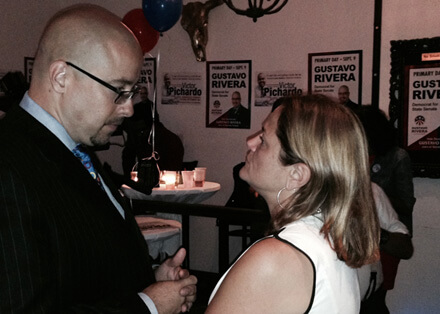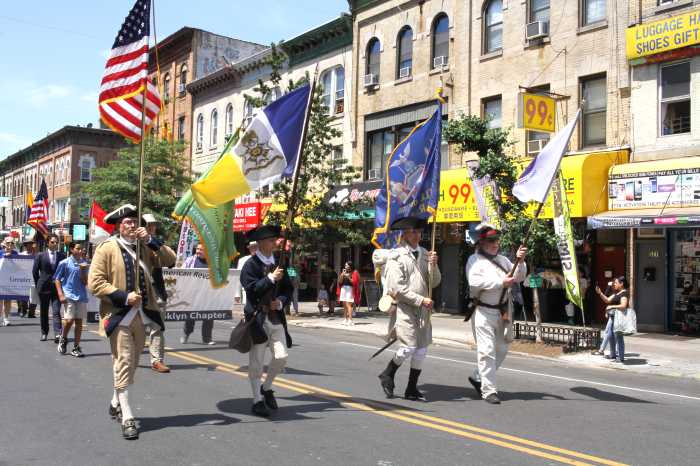As the Cuomo administration embarked on an ambitious plan in 2014 to reduce the number of new HIV infections in New York from the current roughly 3,000 a year to 750 annually by 2020, it recruited nine health agencies from across the state to design a way to implement the use of pre-exposure prophylaxis (PrEP) in targeted populations.
“It’s looking promising,” said Robert M. Hayes, the chief executive of the Community Healthcare Network (CHN), which operates 12 clinics in four boroughs in New York City. “There’s a lot of outreach to continue to do. It’s an important thing, it’s a valuable thing, its works, and we’re committed to continuing to promote it.”
CHN, the Callen-Lorde Community Health Center, and the Betances Health Center each received a five-year, single source contract with the state health department that pays them $50,000 a year through 2019. All three agencies serve “high-risk populations,” according to the state health department. CHN was charged with developing messaging to promote PrEP — anti-HIV drugs used by HIV-negative people to keep them uninfected — to transgender people.
“We clearly are doing outreach promotional work with within the transgender community,” Hayes said.
Community health centers given $250,000 grants over five years to reach at-risk populations
CHN is using that promotional material in “a couple of clubs” that are frequented by transgender people. It also trained dozens of doctors and nurse practitioners to prescribe PrEP in its clinics over a three to four-month period. It now has “just under 500” clients on the drug regimen, though not all are transgender, Hayes said.
When Callen-Lorde signed the contract, it already had roughly 150 clients on PrEP who were enrolled in a study on PrEP implementation. The agency now has 1,136 clients on PrEP and has enrolled 50 to 70 of them in the state’s PrEP Assistance Program, which helps pay for the drug for eligible people.
“We need more awareness, training, and additional resources across New York State to support awareness and target the right people if we truly want to scale up effective PrEP use and access,” Callen-Lorde said in a statement that noted the agency’s support for the Plan to End AIDS and the state’s efforts. “Furthermore, we’re working with our state decision makers to advance legislative proposals for PrEP to be available to young people who are at high risk of HIV infection.”
The Betances Health Center did not respond to an email seeking comment.
In February 2014, the state health department asked Harlem United, the SUNY Downstate Medical Center, APICHA, Evergreen Health Services in Buffalo, Trillium Health in Rochester, and the William F. Ryan Community Health Network to participate in an unfunded PrEP enrollment pilot project. Through November 2014, the agencies put 130 clients on PrEP.
“It wasn’t a heavy lift,” Michael Lee, the head of administration at Evergreen, said of the pilot. “It was quite a few phone calls, it was some data that we had to report.”
At the end of 2014, four of the six agencies each won five-year, single source contracts worth $250,000 over five years to get more people on PrEP. In addition to PrEP recruitment, Trillium and the Ryan Network were also asked to separately develop a social media application that individuals could use to assess their HIV risk and get PrEP information. In the pilot, Harlem United enrolled no clients and SUNY Downstate recruited one client, so they were not among the four agencies receiving contracts.
Gay City News obtained copies of the seven contracts and a related document that justified the need for the single source, or no bid, contracts from the state comptroller’s office. The state health department has yet to produce records sought by Gay City News in a February 2015 Freedom of Information request that asked for all records related to these contracts.
Evergreen, which enrolled 21 clients in the pilot, now has “upwards of about 200 people on PrEP,” Lee said. The agency also won a $110,000 grant from Gilead Sciences, the company that manufactures and markets Truvada, the only drug approved for PrEP. That grant allowed Evergreen to update its website and funded a PrEP billboard campaign.
“I think they’ve done a fantastic job as far as hitting the general channels,” Lee said of the state health department’s efforts. “We do ads on all the hook-up apps… I would say the next step is how can we get a higher number of folks in communities of color on to PrEP.”
Other agencies that won contracts either did not respond to requests for comment or said they would be unable to respond by a deadline. The state health department had not responded as Gay City News went to press.
Governor Andrew Cuomo first endorsed the Plan to End AIDS in June 2014, but the low funding for the plan has been a consistent sore point for AIDS groups. In the current state fiscal year, which began on April 1, an advocate told Gay City News that the Cuomo administration will spend $20 million on the plan, which is well below the $70 million that AIDS groups sought and even below what the Cuomo administration proposed to spend on the plan in November 2015.


































